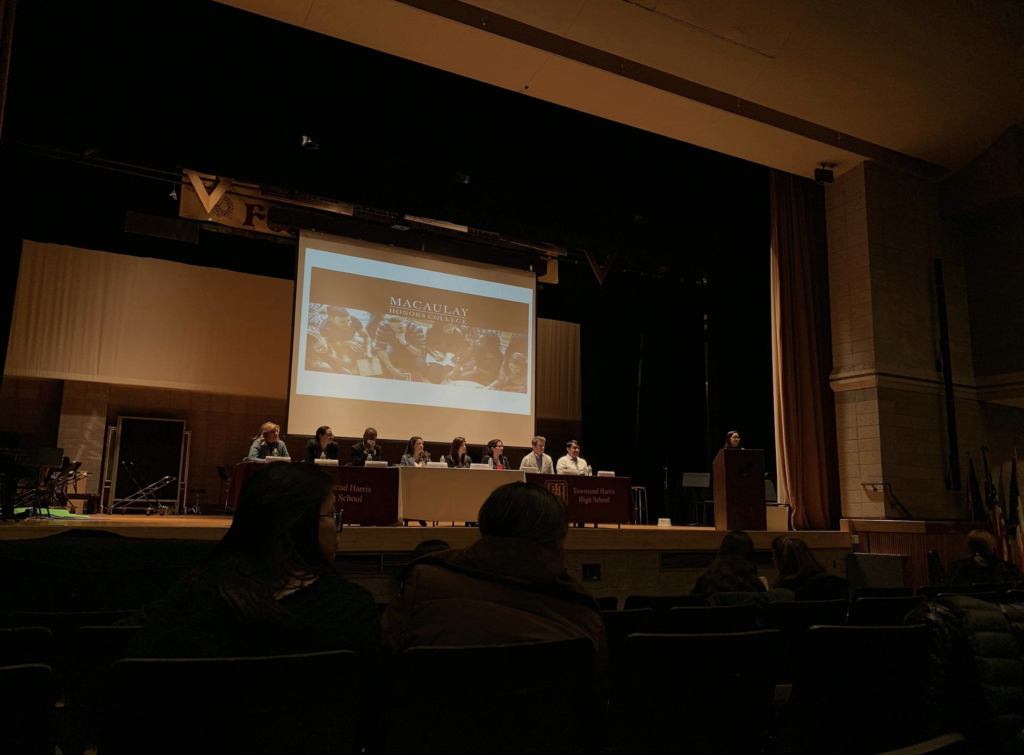
Last Thursday, juniors and their parents attended Junior College Night in the Townsend Harris High School auditorium. A variety of schools including Adelphi University, The Cooper Union, CUNY Macaulay Honors College, Lafayette College, New York Institute of Technology, Rutgers University, Seton Hall University, and Wesleyan University sent representatives to partake in a discussion and answer any questions and concerns. Students were able to learn more about the college process, essays, and specific criteria for each of the colleges in attendance. These subjects were discussed in addition to a list of student-driven questions that was organized beforehand. Afterward, parents and students had the opportunity to ask any questions that they felt were not addressed earlier.
Along with discussions about the general college admissions process, the representatives elaborated on what they look for in applicants. Junior Georgia Malo stated, “The topics [discussed] were pretty much the requirements needed to get into each of the schools, and what sets them apart.” The schools also delved into the academics and extracurriculars that they find especially interesting. According to Wesleyan Associate Dean of Admission James Huerta, a “well- rounded and rigorous program” is important when evaluating prospective students. Adelphi University Senior Coordinator of Special Recruitment Susan Ellis said that “students should take [their] passion and make it global.”
Some students were surprised by other factors aside from grades that top colleges take into consideration, such as the student’s level of interest in the school. Junior Afrida Khalid said, “I found it interesting how much [the representatives] focused on the relationship between the applicant and the school. Prior to this, I always thought that grades and essays would be the sole deciding factors in the admission process, but many of the representatives spoke of how important it was to attend their schools’ open houses and tours, and just show any interest at all.” The college admissions officers referred to this as “a student’s demonstrated interest,” or ways that an applicant shows how serious he or she is about enrolling at a specific college. Interest can be demonstrated by the number of times a student engages with the school, by attending campus information sessions, or even visiting the college’s website. Junior Lori Eng was also surprised to learn that colleges even know when and how many times a student has opened emails and links sent by the school. Her most important takeaway was to “definitely try to reply, especially to the colleges that you want to attend.”
Many students found College Night to be beneficial in learning more about the college application process. Junior Class President Annlin Su said, “Although these aren’t the schools I was initially interested in, it’s really great to learn about other nearby colleges, especially since I haven’t done much research yet.” According to Lori, the event “gave [her] a bit of insight into what colleges are looking for and about how we should choose which schools we are interested in.” On the other hand, some students believed that new ideas, other than the general application process, should have been brought to the table. Georgia explained, “I wish the schools spoke more about the campus life and what a student’s day is like on each campus.”
The college application process has multiple components to evaluate a student in what admissions officers call a “holistic approach.” However, events at THHS are organized to keep students well-informed on what is expected of them while guiding them the whole way. Guidance counselors brought college information to junior classrooms earlier in the week, so College Night kept the theme of the application process fresh in students’ minds. As the juniors approach their senior year and college becomes a more frequent topic of conversation, according to the guidance counselors, more opportunities to learn about admissions will be available.




























